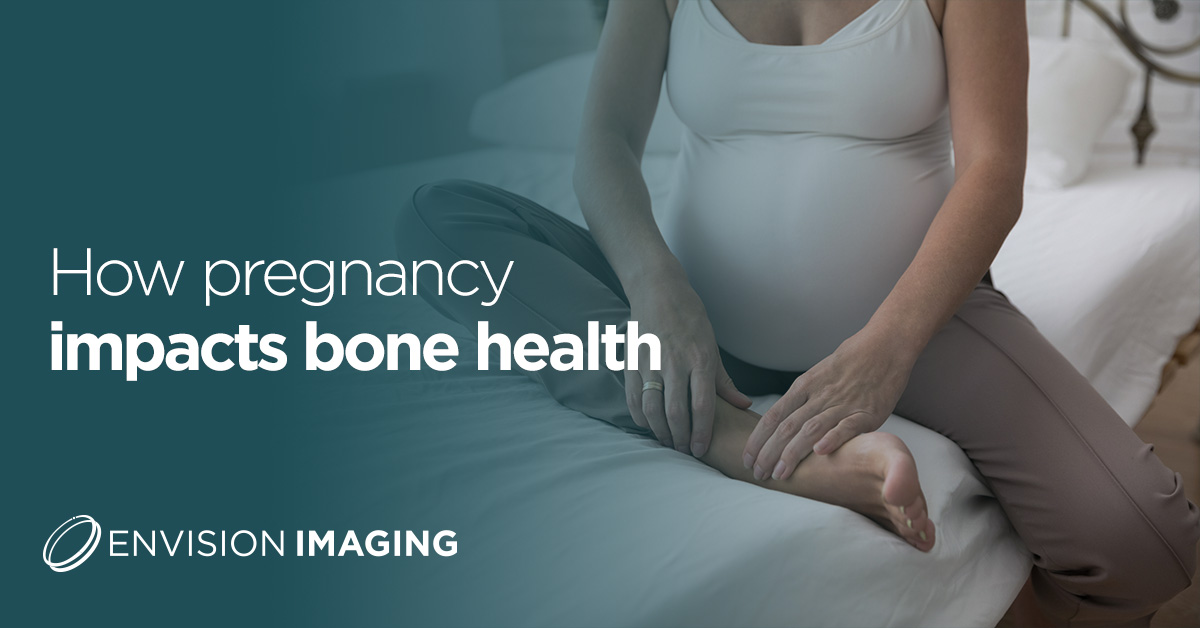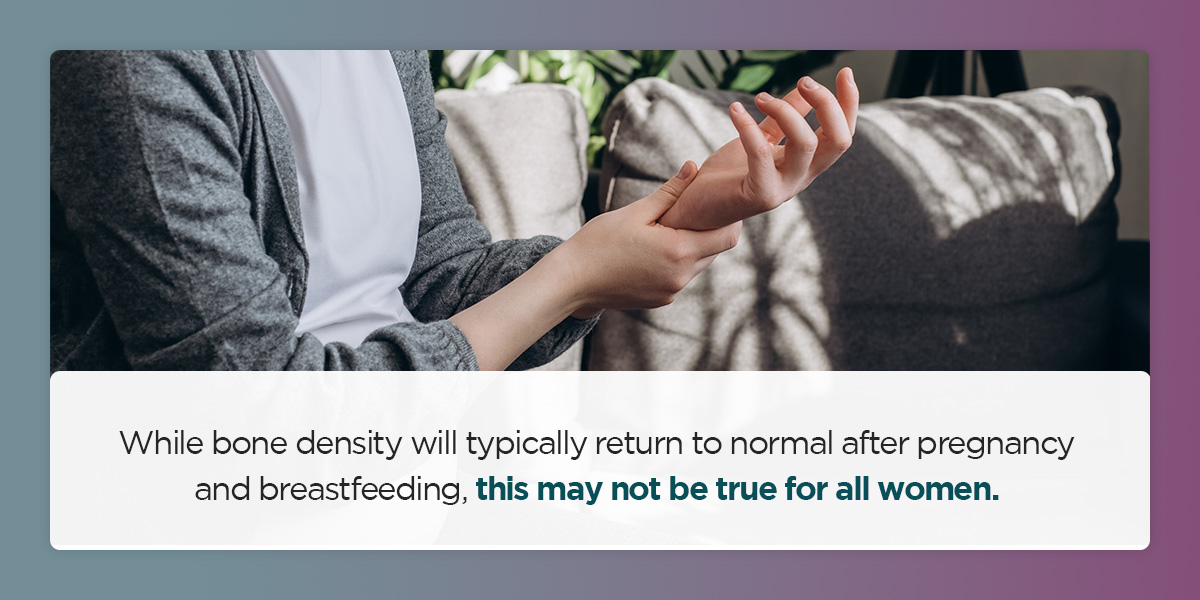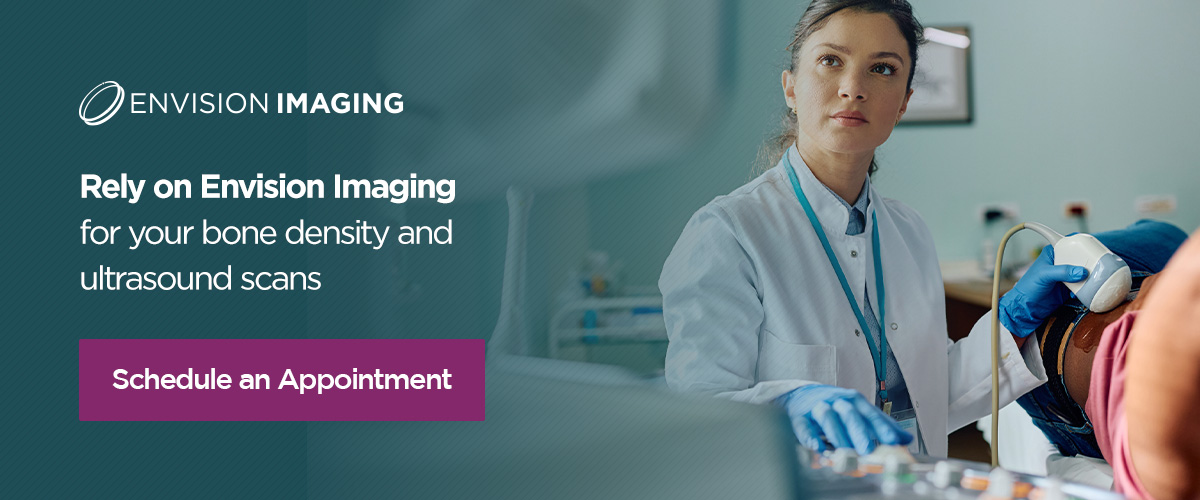How pregnancy impacts bone health
During pregnancy, your body changes to nourish the fetus growing inside of you. Your baby’s well-being is your first priority, and bone health is a crucial consideration. The health of your bones contributes to your baby’s development. Fluctuating hormones and a lack of minerals can affect bone density during pregnancy. To give your unborn baby the best chance of strong bones, you must first look after your own.
Let’s explore the effect of pregnancy on bone health and what you can do to prevent bone loss.
How does pregnancy affect bone density?
As an expectant mother, it’s important to understand how your bones change during pregnancy. The good news is that pregnancy benefits bone health overall.
Estrogen helps with healthy bone formation by regulating the bone-building (osteoblasts) and bone-breaking (osteoclasts) cycle. Estrogen levels skyrocket during pregnancy, encouraging the womb to expand.
Estrogen levels drop during breastfeeding. Your body requires more calcium during lactation, so it pulls calcium from your bones to supply breastmilk, which can result in temporary bone density loss. After breastfeeding, your estrogen levels will typically return to normal, and your body will naturally restore the bone density lost during breastfeeding.
Why is bone health important during pregnancy?
Bone health supports the added skeletal demands of carrying a fetus, and your bone health influences your baby’s bone development. To ensure your baby has strong, healthy bones, it’s essential to get sufficient minerals and vitamins. When your baby doesn’t receive the minerals it needs, it takes it from your bones. This may increase the risk of osteoporosis or brittle bones.
Here are some of the ways that the body adapts to support fetal development:
- The endocrine system produces more estrogen, progesterone and other hormones. Estrogen is responsible for nutrient transfer, blood vessel formation and developmental support. Progesterone expands the uterus and supports the womb lining.
- Cardiovascular output increases to accommodate higher demand. The heart rate increases, as does blood volume.
- A higher amount of oxygen in the blood increases metabolic rates. Metabolic changes mean the body expends more energy when at rest.
What causes bone loss during pregnancy?
For the average person, bone loss usually occurs after, not during, pregnancy. Bone density decreases because of the drop in estrogen and then returns to normal post-breastfeeding or after the regular menstrual cycle returns. This excludes women with preexisting low bone density or mineral deficiencies.
Minerals and vitamins to support bone health in pregnancy
Calcium is necessary for your health, whether or not you’re pregnant. The recommended calcium intake for women 19 to 50 is 1,000 milligrams (mg) daily. Strong bones are essential since pressure on your skeleton increases when carrying a child. As gestation progresses, the fetus gains the minerals it needs from its mother. Around six weeks into prenatal development, osteoblasts form fetal bones. This process, known as bone ossification, continues until about age 25.
Magnesium is another mineral needed to develop strong bones and teeth. This mineral supports nerve and muscle function and helps regulate blood pressure. Pregnant women between 19 and 30 need 350 mg of magnesium daily, while those 31 to 50 need 360 mg daily.
Finally, getting Vitamin D is crucial during pregnancy for bone metabolism. It also helps the body absorb calcium from food and maintain muscle strength. This vitamin contributes to teeth, heart, nervous system and lung development. A Vitamin D deficiency is common in women who live in areas with little sunlight or eat a vegetarian diet.
Who is at risk of bone loss during pregnancy?
While bone density will typically return to normal after pregnancy and breastfeeding, this may not be true for all women. For example, we naturally lose bone density as we age, which could affect older expectant mothers. Additionally, the following factors may increase bone loss risk:
- A family history of osteoporosis
- Inflammatory bowel or Crohn’s disease
- Bone disorders like osteogenesis imperfecta
- A history of eating disorders
- Nutritional deficits, including inadequate calcium, vitamin D, potassium or protein
You should consult an endocrinologist or registered dietician if you experience any of these issues. Addressing these issues early may help improve your bone health.
How can you prevent pregnancy bone loss?
There are many ways to ensure your bones are healthy during pregnancy and beyond.
1. Eat a balanced diet
Your diet should include enough calcium, magnesium and vitamin D to support strong bones. Find these minerals from the following sources:
- Calcium: Calcium is found in milk, cheese, yogurt, kale, broccoli, almonds and salmon. You can also choose calcium-fortified dairy alternatives, such as nut or oat milk.
- Magnesium: Magnesium is naturally present in leafy green vegetables, whole grains, nuts, pumpkin seeds and black beans.
- Vitamin D: Vitamin D is found in a few foods, such as eggs, oily fish and red meat.
Your obstetrician may recommend you avoid the following foods:
- Unpasteurized dairy products, such as cheese
- Unpasteurized juice
- High-mercury fish
- Raw seafood
- Deli meats
- Hot dogs
- Raw or undercooked meat
- Foods containing raw eggs
- Unwashed fruits and vegetables
2. Take supplements
Getting all the vitamins and minerals you need from diet alone may not be possible. Talk to your physician about these supplements:
- Vitamin D: The recommended vitamin D intake is 15 micrograms or 600 international units.
- Calcium: Calcium aids bone development and reduces the risk of hypertensive disorders.
- Magnesium: The benefits of magnesium are well documented. It may benefit bone and pregnancy health.
- Folic acid: Take folic acid before pregnancy and during your first trimester. Although unrelated to bone health, it aids in preventing congenital disabilities.
3. Keep active
Exercise is pivotal in bone health. According to the Centers for Disease Control and Prevention, pregnant women should aim for 150 minutes of moderate weekly exercise. These exercises can help maintain bone health:
- Walking
- Dancing
- Tai chi
- Resistance training
It’s best to check with your physician before embarking on an exercise program. Based on your circumstances and medical history, they can suggest suitable activities.
4. Go for regular prenatal checkups
Checkups by a healthcare provider throughout pregnancy ensure your baby’s healthy development and reduce the risk of complications. The provider can offer advice on everything, from nutrition to birth plans, and may also prescribe supplements to avoid deficiencies.
Screenings, ultrasound imaging and fetal monitoring are used during checkups. Ultrasounds use sound waves rather than radiation, making them safe during pregnancy. These scans check your baby’s bone, muscle and overall development. The doctor also assesses your womb’s health, the position of the fetus and the fetus’s heartbeat.
Why trust Envision Imaging?
Envision Imaging has more than 20 years of experience providing compassionate care to patients. We use world-class diagnostic imaging equipment for accurate and rapid results and are passionate about improving lives through unmistakable quality and spectacular service. We have more than 50 national imaging centers, and our radiology experts provide the fastest turnaround times in the industry so that physicians can focus on treatment.
Many of our patients are expectant mothers. We understand that pregnancy can be exciting and unnerving, but you can have confidence knowing that when visiting an Envision Imaging center, we put you and your baby’s health first. We offer dedicated women’s health imaging, including bone density scans and ultrasounds.
Rely on Envision Imaging for your bone density and ultrasound scans
Envision Imaging uses cutting-edge diagnostic imaging tools operated by leading radiology technologists. From the moment you walk through the door, you can expect the highest quality of care in a warm and welcoming environment.
We put our patients first and partner with most insurers to offer affordable solutions. Envision Imaging is here for you and your imaging needs, whether you need a DEXA bone density scan or a prenatal ultrasound.
Reach out to request your diagnostic imaging appointment or learn about our services.




